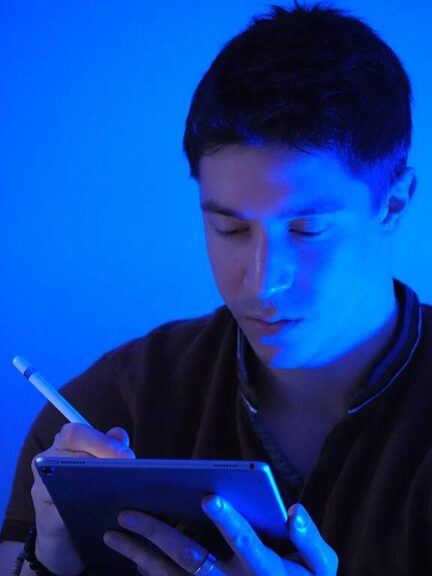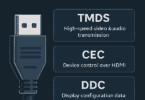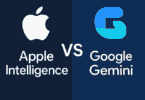We all know that some devices are there like laptops, smartphones and other electronic handheld devices which can transmit light. But the blue light can cause harm to your eyes. It could even lead to macular degeneration, which is a major reason for losing vision in the United States. When the photoreceptor cell dies in the retina, it is called macular degeneration. However, most people use these types of electronic devices, such as gaming systems, TVs, tablets, smartphones, etc for many hours every day. But how does the blue light in your phone actually hurt your eyes? Let’s dig into the article to know in detail.
What is Blue Light?
It is a part of the visible light spectrum seen by the human eye. This spectrum has the highest energy and shortest wavelength. It vibrates within the 380 to 500 nanometer range and has the highest energy & shortest wavelength. We consider blue light about 1/3rd of all visible light. The biggest source of blue light is sunlight. Artificial sources of blue light are as follows:
- fluorescent light,
- LED TVs,
- smartphones,
- computer monitors, and
- tablet screens.
Are There Health Benefits Of Blue Light?
The light helps to boost alertness. Besides, it can elevate mood. In addition, it is useful in boosting brain and memory function. It helps to regulate the sleep cycle of our body. You should know that sunlight is important in developing eyes and vision in kids. Let’s see the benefits of this type of light:
- Help You Stay Alert:
Your reaction time can be perked up by the exposure to blue light. Also, it stimulates alertness.
- Boost Memory And Cognitive Function:
According to a small 2017 study, some participants had experienced a 30-minute blue light “washout” period. And they performed better on memory consolidation and verbal memory tasks.
- Potentially Improve Seasonal Depression:
In order to get relief from seasonal depression, blue light therapy is the ultimate treatment. According to the researchers, this one is an effective treatment for depression, when you combine this therapy with antidepressant medications.
- Improve Acne:
It is the blue light which can kill acne-causing bacteria. In addition, this type of light helps in reducing inflammation in acne breakouts. Whether you use blue light devices at home, ensure that you choose one which the FDA or the Food and Drug Administration approves.
Does The Blue Light In Your Phone Actually Hurt Your Eyes?
The exposure to blue light from the sun is bigger compared to the amount of exposure from screens. However, we know that screen exposure from digital devices can affect humans in the long term. It is mainly true when you are in front of the screen for a long period. In addition, it is true when screens are too close to the eyes.
As per a report, digital devices are used by 80% of adults in America for more than two hours every day. Two or more digital devices are used by almost 67% of people at a time. 59% of people have the signs of digital eye strain symptoms.
Human eyes are not capable of blocking blue light. Therefore, every part of this visible light can pass through your eyes’ front portion. In this way, the light can reach the retina and the cells that are used to convert light for the brain with the purpose of processing it into pictures.
Retina cells can be damaged due to constant exposure to blue light. As a result, vision problems like age-related macular degeneration can occur. Even people can face issues like eye cancer, cataracts and so on. A vision study by the National Eye Institute says that kids have more risks than adults. The reason is that more blue light is absorbed by the eyes of children from digital devices.
You may blink less at the time of using digital devices. As a result, you may face dry eye and eye strain problems. Other signs of eye strain include neck and shoulder pain, headaches, blurred vision, and many more. As per reports, 27-35% of American people experience such symptoms after they use digital devices.
Risks And Side Effects Of Blue Light Exposure:
According to some studies, blue light emitted from handheld devices and PC screens is not so harmful to your eyes. However, there exist a few other risks that you should consider. Let’s see the risks and side effects of blue light exposure.
Blue Light And Macular Degeneration:
As per the American Academy of Ophthalmology (AAO), people over fifty years old mostly suffer from AMD or Age-related macular degeneration issues. AMD happens when the macula, which is a structure in the back side of your eye, is damaged.
It results in losing your ability to see the middle position of your vision field. Although you can see things on the periphery, you will find objects blurry when these are in the centre of your sight lines. Moreover, over time, it will be more difficult to see.
Blue Light And Digital Eye Strain:
If you use digital devices close to your eyes, it can cause digital eye strain. Also you can suffer from this issue when you are using these kinds of devices for long periods. According to research, people blink less often than usual when they use electronic devices like laptops, computers, and so on. Remember that fewer blinks mean that the amount of moisture is less.
Digital eye strain is related to the eyes focusing system. Are your eyes strained due to staring at a blue-light-emitting screen? These are some of which you can experience:
- dry eyes
- sore or irritated eyes
- tired eyes
- headaches
- facial muscles fatigued by squinting
Compared to other visible light, this light is able to scatter more easily. As a result, your eye may face difficulties in focusing at the time of receiving blue light. Rather than that, your eye can even absorb the light. As a result, your eyes can not easily process blue light, leading to eyestrain.
Blue Light And Sleep:
A 2019 review said that if the light irritates your sleep cycles, you can face other issues:
- an elevated risk of hormone-related cancers, including prostate and breast
- lower levels of leptin
- metabolic changes like blood sugar
How Can You Reduce The Negative Effects Of Blue Light?
- You should try to use blue-light filters for regular electronic devices like tablets, smartphones, and computer screens. With the help of the filters, you are able to stop much of the blue light from reaching your eyes. The best thing is that it does not affect the display’s visibility.
- You can reduce digital eye strain by following the 20-20-20 rule. Hence, you need to take a break for twenty seconds every twenty minutes in order to see something that is 20 feet away.
- It is possible to control lighting and glare on the device screen. You need to set up a posture for screen viewing. Also, try to set up a good working distance. Ensure that if there is even any minor vision problem, it is corrected properly.
- You should consult your eye doctor about blue light protection and the use of digital devices.
How To Limit Blue Light Exposure:
AAO recommends following these steps for reducing digital eye strain:
- Keep Your Eyes Moist:
When you use blue-light-emitting devices, you should use eye drops like room humidifiers and artificial tears. These are the best ways to prevent your eyes from becoming too dry.
- Use Eyeglasses With The Right Prescription:
We do not recommend squinting at screens for long periods. Do you wear prescribed eyeglasses for improving your vision? So, ensure that you are putting on prescribed eyeglasses, which are ideal for the distance between your screen and your eyes. In most cases, the formulation of the glasses is done for longer distances.
- Adjust The Blue Light On Your Screen:
You may need to set screens to a “night shift” setting when you want to reduce the risk of sleep disturbance and eye strain. When you work at night, to slip over PC screens, you need to buy blue-light-filtering screens. The filter might cut your screen’s glare.
According to 2020 research, 30-60% of blue light is blocked by them. But we can not say for sure if blocking the blue light lets you preserve the sleep-wake cycle when you use a backlit screen before bedtime.
- Skip The Blue-blocking Specs:
As per studies, the light can be reduced with the help of blue-blocking glasses. But AAO does not recommend them completely to protect your eyes. The reason is that not enough evidence is there saying they reduce eyestrain or improve the health of your eye.
The Bottom Line:
Blue light is one of the parts of the natural electromagnetic energy spectrum. Sun is the major source of blue light and most of our exposure to this light comes from there. However, a few health experts doubt if artificial blue light is harmful to your eyes.
According to a few studies, cells in laboratory animals get damaged by this light. However, we do not have much research saying that the light which is emitted from digital devices and LED screens damages human eyes. However, we will advise you to take breaks frequently when you have to use digital devices for long periods in your work or school.
Frequently Asked Questions
- How does blue light affect sleep?
Before bedtime, exposure to this light disrupts sleep patterns. The reason is that it affects when human bodies are making melatonin. If interruption of the circadian system occurs, it can lead to some diseases, which include cancer, cardiovascular disease, type 2 diabetes, sleep disorders, and cognitive dysfunctions.
- Will blue light glasses help with eye strain?
Although multiple studies are available on these glasses, no consensus is there. Overexposure to this light causes eye strain. Therefore, wearing these glasses is helpful in protecting eyes from eye strain. Using digital devices for long periods can cause digital eye strain. That is why you should wear blue light glasses.
- Are blue light glasses worth it?
During the day, when you wear these types of glasses, it allows you to have a more restful sleep. Remember that generic lenses are used to filter the light and negative effects can be reduced by 10-23% using these lenses. There are a few computer glasses which include yellow-tinted lenses. When you view electronic devices for long, these glasses help to increase comfort.







